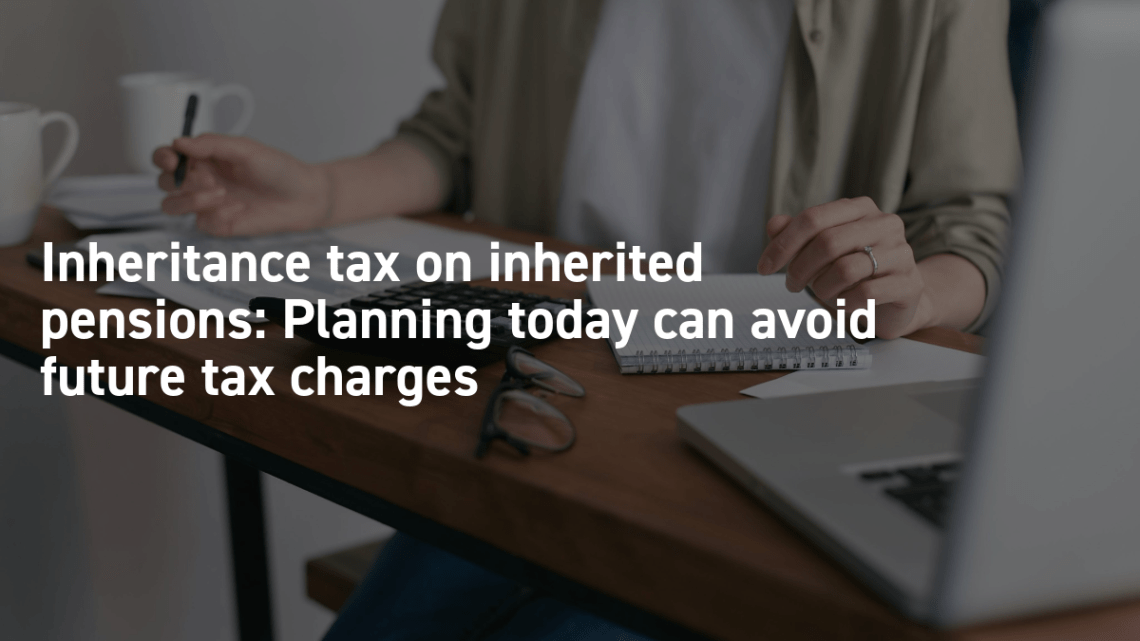
In the 2024 Autumn Budget, Chancellor Rachel Reeves announced that pensions and death benefits passed to beneficiaries will become subject to inheritance tax (IHT) from 6 April 2027.
The Government has said the change will align their tax treatment with other types of inherited assets and remove the incentive to use pensions as a tax-planning vehicle for tax-free wealth transfer after death.
Both defined contribution and defined benefit pension schemes will be impacted, and although April 2027 is some way off, proactive planning now may help individuals to avoid future tax charges.
The current position
As it stands, funds in a ‘pension pot’ are not subject to IHT and can be passed to beneficiaries without any IHT considerations. Broadly speaking, if the death occurs before the age of 75, then no tax at all will apply, whilst if the death occurs after 75, income tax is payable by the beneficiary at their marginal rate.
This current status quo followed the introduction of reforms to pensions death benefits by George Osborne in 2014, which were welcomed by many as a game changer that provided people with much greater freedom in their older age.
In practice, it led many people to organise their retirement finances in a manner that preserves money held in pensions so that it can be passed on free of IHT. It made sense for them to use money from other sources in retirement – such as ISAs and other savings – before turning to their pensions.
Proposed changes
The Government has not provided any detail at this stage, but broadly speaking, from April 2027, any unused pension funds and death benefits payable from a pension will be brought into the IHT net, other than for transfers between spouses and civil partners, which will remain exempt.
The Government ran a consultation on implementing the changes, which closes this month, but the fundamental changes are widely expected to remain as announced. This means that inherited pensions will become subject to a 40% IHT. Additionally, for beneficiaries of pension members who pass away after reaching 75, the inherited pensions will also be subject to income tax at the beneficiary’s marginal rate. In some cases, unless some tax relief is given, the combined effective rate of tax could be as high as 67%.
Here is an example to illustrate this potential double taxation:
Where IHT is due, £100 of pension money would be subject to 40% IHT, leaving £60. If the death occurs after age 75, this money would then be subject to the beneficiary’s rate of income tax. In the worst case, this would be 45%, resulting in just £33 being received by the beneficiary – an effective tax rate of 67%.
The inclusion of pensions in estates for IHT purposes also means that more people will run the risk of exceeding another key threshold. Under the existing rules for IHT, the primary residence nil-rate band of £175,000 (that is an additional IHT free band available to utilise against the value of the main residence) begins to be tapered away once an estate exceeds £2 million in value. By including pensions in an estate, it is easier for the £2 million threshold to be exceeded.
On a more positive note, there have not been any changes to tax relief on pension contributions, no changes to the lump sum provisions, and no reversal of the abolishment of the lifetime allowance by the previous government.
What does this mean for HW Fisher’s clients?
It is important to now review existing plans and strategies to ensure they are still fit for purpose. People should use the time remaining before April 2027 wisely.
Individuals should consider drawing down their pensions earlier in retirement rather than leaving funds untouched for inheritance purposes. One strategy is to gift the tax-free lump sum (£325,000) and hope to survive for seven years. It is also important to review death benefit nominations to ensure that they reflect current wishes and optimise tax efficiency.
There are other possibilities to save on IHT, now that this route seems to have been abolished. For example, making gifts out of income into a child’s pension fund (if direct gifts are not suitable for fear of frivolous spending) may have a similar effect, economically and avoids the use of trusts.
Please do not hesitate to contact Simon if you would like to find out more.
We’d love to hear from you. To book an appointment or to find out more about our services: